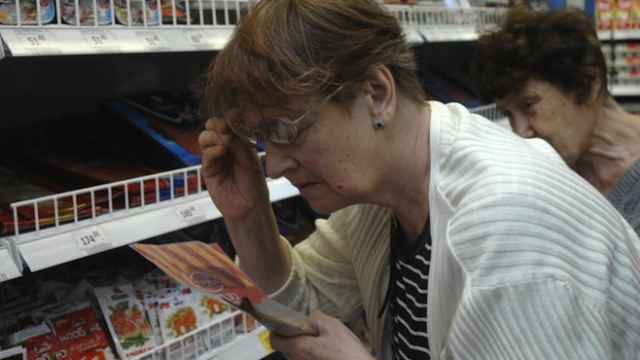After a deep recession this year, the Russian economy will likely stabilize in 2016 as tensions over Ukraine subside, the European Union's executive arm said in a report published Thursday.
The forecast is based on the assumption that economic sanctions against Russia will not be renewed in July and oil prices will see a "slight rebound," the European Commission's forecast said, adding that risks factors include instability in Russia's banking sector and uncertainty over oil price movements.
Steep falls in the price of oil and torrential capital outflows amid Western sanctions have sent Russia reeling into a recession this year. The ruble currency fell more than 40 percent against the U.S. dollar in 2014, stoking inflation and forcing the Central Bank to hike its key interest rate to levels prohibitive for investment.
The news for this year is less than rosy. Sharp falls in investment, one of the main factors pushing Russia into recession, will continue through 2015 as borrowing costs rise, the business climate deteriorates and Western sanctions press on foreign banks' willingness to lend to Russian firms, the report found.
Consumer spending — long a key growth driver — will also drop this year as Russians' real incomes come under pressure from rising inflation. Private consumption will make a "modest recovery" in 2016, the report said.
As recession hits, unemployment will rise "quite markedly in 2015 and, to a lesser extent, in 2016," it added.
Analysts are predicting a 4 to 5 percent drop in Russia's gross domestic product this year. The Russian government recently forecast a more moderate 3 percent decline.
The same report said that the European Union's economy will grow this year for the first time since 2007 — the period right before the 2008 global financial crisis. Growth is forecast to reach 1.7 percent across the EU and 1.3 percent in the eurozone.
A Message from The Moscow Times:
Dear readers,
We are facing unprecedented challenges. Russia's Prosecutor General's Office has designated The Moscow Times as an "undesirable" organization, criminalizing our work and putting our staff at risk of prosecution. This follows our earlier unjust labeling as a "foreign agent."
These actions are direct attempts to silence independent journalism in Russia. The authorities claim our work "discredits the decisions of the Russian leadership." We see things differently: we strive to provide accurate, unbiased reporting on Russia.
We, the journalists of The Moscow Times, refuse to be silenced. But to continue our work, we need your help.
Your support, no matter how small, makes a world of difference. If you can, please support us monthly starting from just $2. It's quick to set up, and every contribution makes a significant impact.
By supporting The Moscow Times, you're defending open, independent journalism in the face of repression. Thank you for standing with us.
Remind me later.





